Related Research Articles

Friedrich Ludwig Gottlob Frege was a German philosopher, logician, and mathematician. He was a mathematics professor at the University of Jena, and is understood by many to be the father of analytic philosophy, concentrating on the philosophy of language, logic, and mathematics. Though he was largely ignored during his lifetime, Giuseppe Peano (1858–1932), Bertrand Russell (1872–1970), and, to some extent, Ludwig Wittgenstein (1889–1951) introduced his work to later generations of philosophers. Frege is widely considered to be the greatest logician since Aristotle, and one of the most profound philosophers of mathematics ever.
Crispin James Garth Wright is a British philosopher, who has written on neo-Fregean (neo-logicist) philosophy of mathematics, Wittgenstein's later philosophy, and on issues related to truth, realism, cognitivism, skepticism, knowledge, and objectivity. He is Professor of Philosophical Research at the University of Stirling, and taught previously at the University of St Andrews, University of Aberdeen, New York University, Princeton University and University of Michigan.
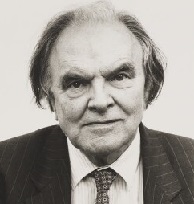
Peter Thomas Geach was a British philosopher who was Professor of Logic at the University of Leeds. His areas of interest were philosophical logic, ethics, history of philosophy, philosophy of religion and the theory of identity.
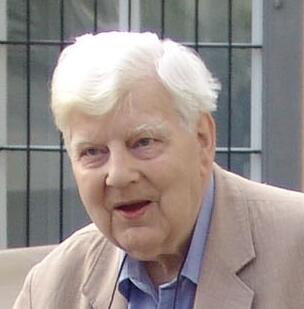
Sir Michael Anthony Eardley Dummett was an English academic described as "among the most significant British philosophers of the last century and a leading campaigner for racial tolerance and equality." He was, until 1992, Wykeham Professor of Logic at the University of Oxford. He wrote on the history of analytic philosophy, notably as an interpreter of Frege, and made original contributions particularly in the philosophies of mathematics, logic, language and metaphysics.
The year 1925 in science and technology involved some significant events, listed below.
In semantics, mathematical logic and related disciplines, the principle of compositionality is the principle that the meaning of a complex expression is determined by the meanings of its constituent expressions and the rules used to combine them. The principle is also called Frege's principle, because Gottlob Frege is widely credited for the first modern formulation of it. However, the principle has never been explicitly stated by Frege, and arguably it was already assumed by George Boole decades before Frege's work.

Charles Dacre Parsons was an American philosopher best known for his work in the philosophy of mathematics and the study of the philosophy of Immanuel Kant. He was professor emeritus at Harvard University.
Bruno Bauch was a German neo-Kantian philosopher.
Psychologism is a family of philosophical positions, according to which certain psychological facts, laws, or entities play a central role in grounding or explaining certain non-psychological facts, laws, or entities. The word was coined by Johann Eduard Erdmann as Psychologismus, being translated into English as psychologism.
James Ferguson Conant is an American philosopher at the University of Chicago who has written extensively on topics in philosophy of language, ethics, and metaphilosophy. He is perhaps best known for his writings on Wittgenstein, and his association with the New Wittgenstein school of Wittgenstein interpretation initiated by Cora Diamond.
In metalogic and metamathematics, Frege's theorem is a metatheorem that states that the Peano axioms of arithmetic can be derived in second-order logic from Hume's principle. It was first proven, informally, by Gottlob Frege in his 1884 Die Grundlagen der Arithmetik and proven more formally in his 1893 Grundgesetze der Arithmetik I. The theorem was re-discovered by Crispin Wright in the early 1980s and has since been the focus of significant work. It is at the core of the philosophy of mathematics known as neo-logicism.
Gordon Park Baker was an American-English philosopher. His topics of interest included Ludwig Wittgenstein, Gottlob Frege, Friedrich Waismann, Bertrand Russell, the Vienna Circle, and René Descartes. He was noted for his collaboration with Peter Hacker and his disagreements with Michael Dummett.
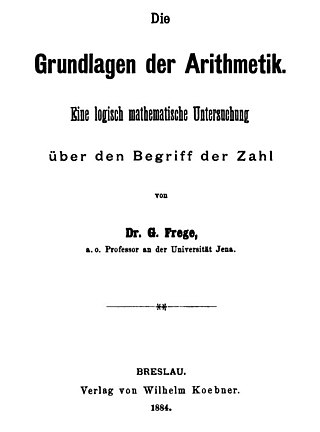
The Foundations of Arithmetic is a book by Gottlob Frege, published in 1884, which investigates the philosophical foundations of arithmetic. Frege refutes other idealist and materialist theories of number and develops his own platonist theory of numbers. The Grundlagen also helped to motivate Frege's later works in logicism.
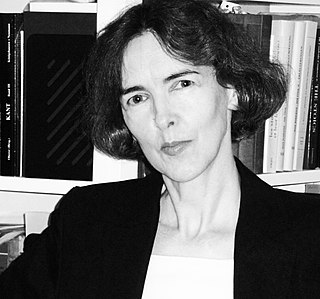
Susanne Bobzien is a German-born philosopher whose research interests focus on philosophy of logic and language, determinism and freedom, and ancient philosophy. She currently is senior research fellow at All Souls College, Oxford and professor of philosophy at the University of Oxford.
1995 in philosophy
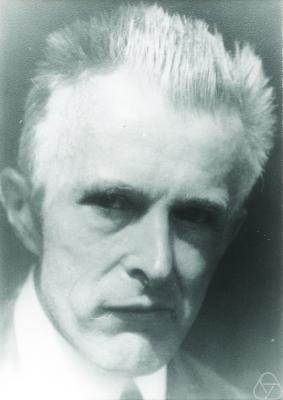
Heinrich Scholz was a German logician, philosopher, and Protestant theologian. He was a peer of Alan Turing who mentioned Scholz when writing with regard to the reception of "On Computable Numbers, with an Application to the Entscheidungsproblem": "I have had two letters asking for reprints, one from Braithwaite at King's and one from a professor [sic] in Germany... They seemed very much interested in the paper. [...] I was disappointed by its reception here."
1848 in philosophy
Patricia A. Blanchette is an American philosopher and logician, the McMahon-Hank Professor of Philosophy at the University of Notre Dame. She specializes in the history of philosophy, history of logic, philosophy of logic, philosophy of mathematics, and philosophy of science, and is the author of a book on the logic of Gottlob Frege.
Leila Tuulikki Haaparanta is a Finnish philosopher who works in analytic philosophy and the philosophy of logic. She is retired from the University of Tampere as a professor emerita.
Claude Imbert is a French philosopher, logician, and translator of Gottlob Frege.
References
- ↑ Zalta, Edward N. "Gottlob Frege". The Stanford Encyclopedia of Philosophy (SEP). Archived from the original on 7 October 2008. Retrieved 25 February 2013.